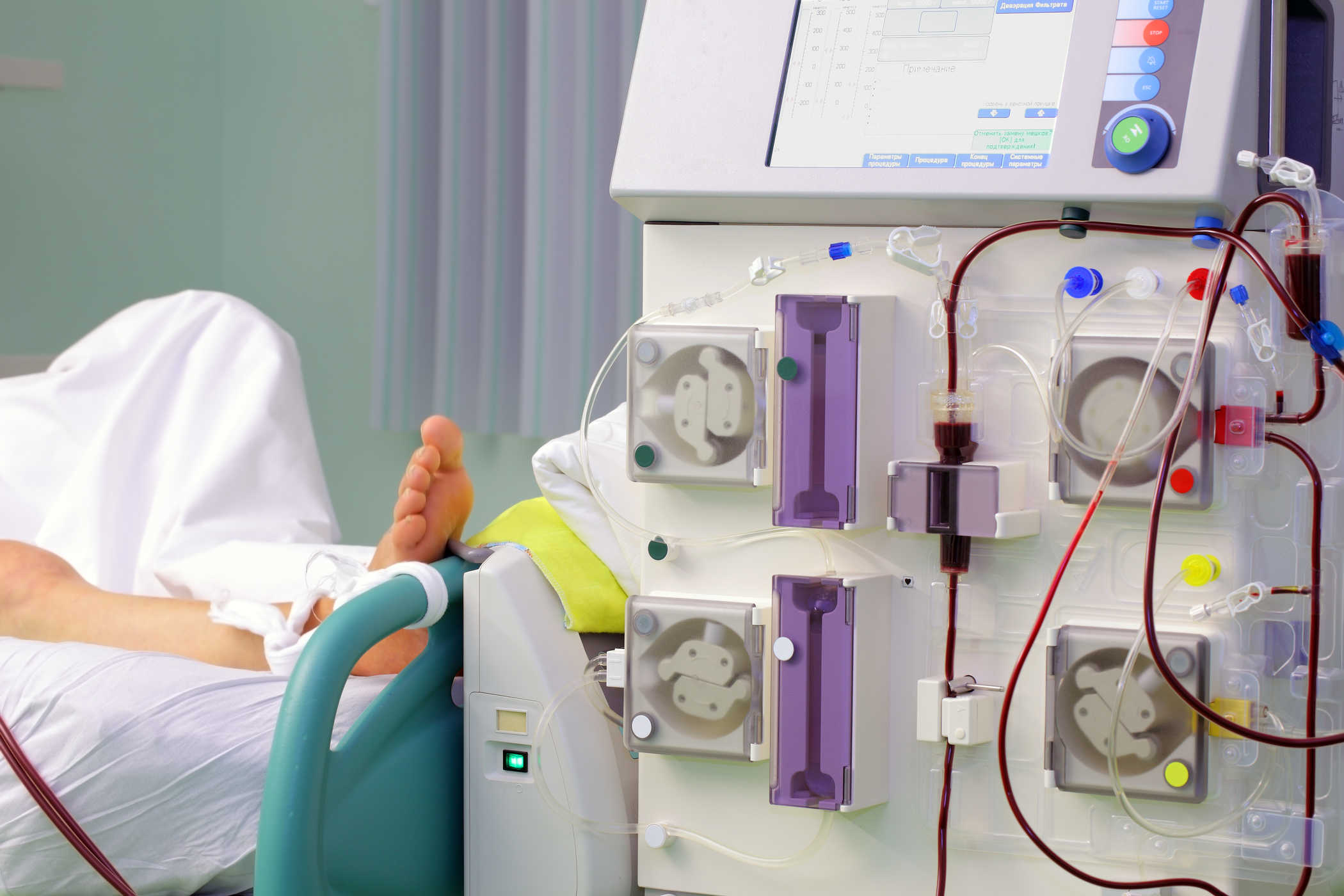Contents:
- Medical Video: Nclex Practice Questions! - Hemodialysis / ESRD/ CKD
- What is hemodialysis?
- How does hemodialysis work?
- What complications might occur from hemodialysis?
- Are diet changes needed?
- What are the pros and cons of hemodialysis?
- Hemodialysis in a health clinic
- Hemodialysis home
Medical Video: Nclex Practice Questions! - Hemodialysis / ESRD/ CKD
What is hemodialysis?
Hemodialysis cleanses and filters your blood using a machine to temporarily cleanse your body of harmful waste, extra salt and extra water. Hemodialysis helps control blood pressure and helps your body maintain important chemical balance such as potassium, sodium, calcium, and bicarbonate.
Dialysis can replace kidney function. Diet, medication, and fluid limits are often needed too. The diet, fluids, and the amount of medication you need will depend on the treatment you choose.
How does hemodialysis work?
Hemodialysis uses a special filter called a dialyzer that functions as an artificial kidney to cleanse your blood. Dialyzer is a tube that is connected to a hemodialysis machine.
During treatment, your blood moves through the tube into the dialyzer, which filters waste, extra salt, and extra water. Then, the cleansed blood flows through a set of tubes back into your body. The hemodialysis machine monitors blood flow and removes waste from the dialyzer.
Hemodialysis is usually done three times a week. Each treatment lasts 3 to 5 hours or more. During treatment, you can read, write, sleep, talk or watch TV.
What complications might occur from hemodialysis?
Vascular access problems are the most common reason for hospitalization among people who do hemodialysis. Common problems include infections, blockages from clots, and poor blood flow. These problems can interfere with your care. You may need to undergo surgery repeatedly to get functioning access.
Other problems can be caused by rapid changes in water and your body's chemical balance during treatment. Muscle cramps and hypotension (a sudden drop in blood pressure) are two common side effects. Hypotension can make you feel weak, dizzy, or stomach ache.
You may need several months to adjust to hemodialysis. Side effects can often be treated quickly and easily, so you should always report it to the staff of your doctor and dialysis team. You can avoid many side effects if you follow the right diet, limit your fluid intake, and take medication as directed.
Are diet changes needed?
Hemodialysis and the right diet reduce the waste that builds up in your blood. A dietician is available at all dialysis centers to help you plan meals according to your doctor's orders. When choosing food, remember to:
- Eat a balanced amount of foods high in protein such as meat, chicken and fish.
- Control the amount of potassium you eat. Potassium is a mineral found in salt substitutes; some fruits, such as bananas and oranges, vegetables, chocolate, and nuts. Too much potassium can harm your heart.
- Limit how much you drink. When the kidneys don't work, water forms quickly in your body. Too much fluid makes your tissues swell and can cause high blood pressure, heart problems, and cramps and low blood pressure during dialysis.
- Avoid salt. Salty foods make you thirsty and increase your body's water intake.
- Limit foods such as milk, cheese, beans, and dried beans. This food contains a lot of phosphorus. Too much phosphorus in your blood causes calcium to be pulled from your bones, which makes them weak and brittle and can cause arthritis. To prevent bone problems, your doctor may provide special medicines, which you should use with food every day as directed.
What are the pros and cons of hemodialysis?
Everyone responds differently to the same situation. What might be a negative factor for one person might be positive for another. See the list of advantages and disadvantages of hemodialysis at the clinic and at home in the list below.
Hemodialysis in a health clinic
Pro:
- Widely available facilities.
- Professional officers are trained with you at all times.
- You can get to know other patients.
- You don't have to have a partner or have to take care of the equipment in your home.
Counter:
- Treatment is scheduled by the clinic and is relatively fixed.
- You must travel to the clinic for treatment.
- This treatment has a strict diet and lots of fluid restrictions.
- You will need to use and pay more for medicines.
- You may feel a feeling of ups and downs in how you feel from day to day.
- It may take several hours to feel better after treatment.
Hemodialysis home
Pro:
- You can do it at the time you choose - but you still have to do it as often as your doctor orders.
- You don't have to travel to the clinic.
- You get a sense of independence and control over your care.
- The machine will need less space.
- You will experience fewer tidal feelings in how you feel from day to day.
- Hemodialysis home work is more friendly than treatment at the center.
- Your diet and fluids will be more normal
- You can carry a new portable machine in a car, while camping, or on a plane.
- You can spend more time with people you love.
Counter:
- You have to have someone else at home who cares for you.
- Helping with your care may be stressful for your family.
- You and the person caring for you will need training.
- You need space to store machinery and equipment at home.
- You may need to take time off from work to complete the training.
- You will need to learn to enter dialysis needles.
- Daily hemodialysis and nocturnal home hemodialysis are not yet available in all locations.












